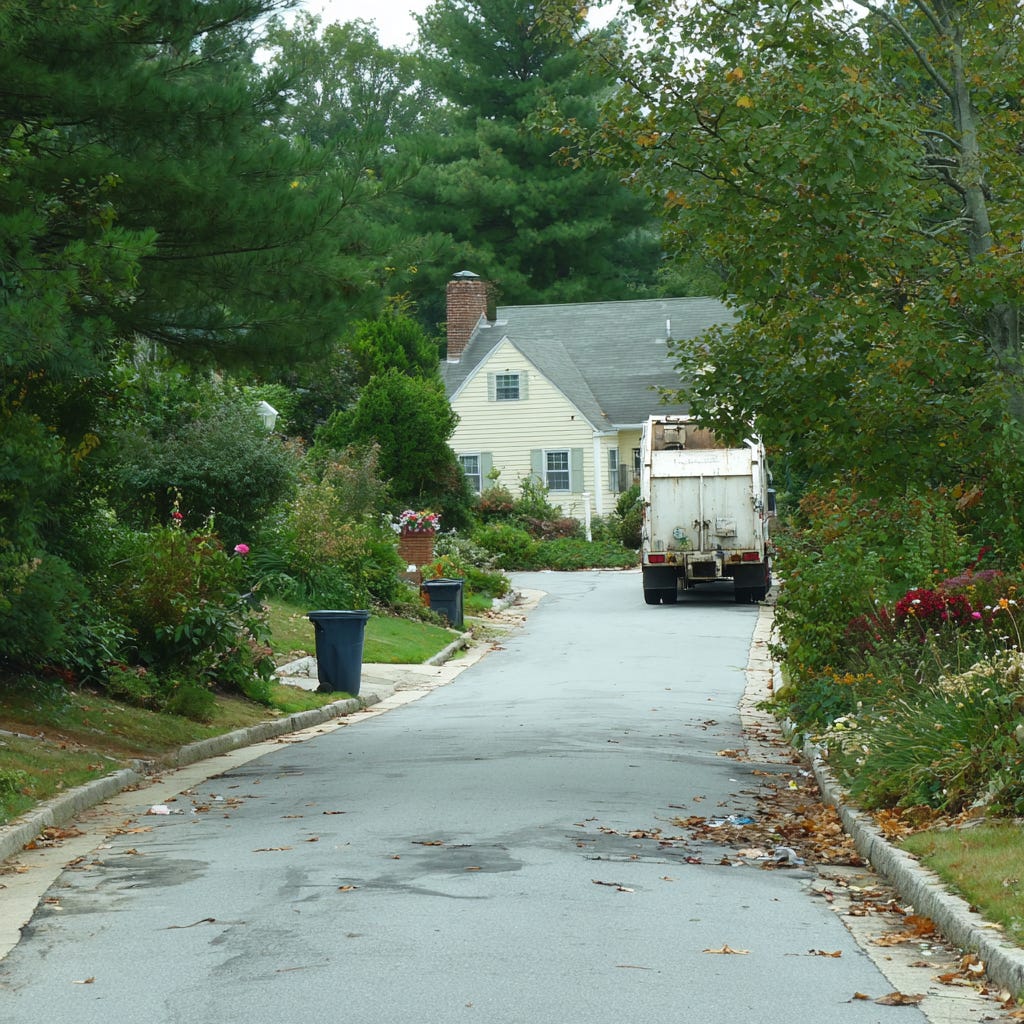If we were to give Burby awards for jacket design, Croton-on-Hudson’s Cecilia Kochanowski’s Plumbersutra would not receive one. A tawny-handled toilet plunger on a field of textured dark brown with type the color of European teeth, it did not say—as we used to describe the desired effect in cover meetings—“pick me up.”
But such concerns matter chiefly for books that achieve some portion of their lives face-out at a modern book retailer, and this one surely never was.
Plumbersutra was spine-out at the Croton Free Library but we were motivated to pull it out—and indeed to pick it up, though we thought just for cataloging purposes—by the CFL’s “LOCAL AUTHOR” sticker. It gives us a jolt of north county pride to see it every time but that’s generally as far as it goes. Due to the inefficiencies of the longform medium—and the current intern situation—we cannot review but a percent of books so-labeled. And so that would have been it—town, BISAC, author, title, subtitle—except that last bit caught our eye and got us to think past that sewer-field of a jacket. It reads, "The Art of Living in the Suburbs.”
And then we reconsidered the main title itself—Plumber. Sutra. And we were in the memoir section. Might this be a book about the seldom-mentioned-by-realtors (who doubtless aren’t eager to water down their metaphorical cocktail) sexual prowess of our plumbers?
It takes them forever to come AND there’s no crevice so dank or dirty you can’t pay them to . . .
It ended up not being a terribly salacious a read. We belatedly have learned that the kama in the Kama Sutra is the sex part. Sutra just means book.
It’s not a book about plumbers, either. And it’s not really about what the subtitle promises—the art of living in the suburbs—it’s a mini-memoir by a woman who moves to Croton with her family and goes through that first of the sacred rites of elite home-ownership, the remodel.
Whatever the core subject, we are too spoiled to read more than ten pages of books that are terribly written (even if we are hoping to see plumbers getting handy) but that was not the case here. It is a highly readable little book, and we finished it in a breezy few hours.
Kochanowski is a fine wordsmith. In maybe the first chapter, she knocked our inner poet off his lectern with this line—
A warm breeze stirred my hair and made the trees rustle, the sound lunch bags make right before they're thrown away.
And she is capable of the wonderfully direct character- and class-skewering prose favored by detective-thriller copagandists like Scarborough’s James Patterson.
She describes a village clerk fixing her husband with
the stare favored by petty bureaucrats worldwide. The stare that says, thanks to having to respond to you and your insignificant needs, my coffee may get cold before I get to take another sip.
She presumably felt comfortable with the “worldwide” claim because she and her husband have—though she’s a Chicago-area native—just moved to Croton from Poland, and we more than once are taken to that country to compare and contrast our dystopian village bureaucracy.
How many times had we dealt with this in Poland: in banks, the post office. The air of bored arrogance, translating the enormous favor that is the attention of some poorly paid clerk. In Warsaw, we had always excused this attitude as the product of forty years of communism: that the next generation of clerks would schooled in the ways of the capitalist West and would offer good old customer service.
At the same time, she presumably felt uncomfortable using her human kebabs’ real names. We haven’t completely researched the matter but a cursory search—and our own experience in Croton—suggests she has protected the non-innocent. (And, perhaps, her future self at the grocery store.)
She accurately describes the painting (Freedom of Speech) in Croton’s main municipal meeting chamber as being the work of Norman Rockwell, but we have been unable to locate record of any engineering office clerks named Janet, nor of any village dignitaries surnamed Grasso, Abbott, or Kampl.
Which, in the end, highlights our chief take-away about this book: Plumbersutra is a quintessential chronicle of late-capitalist suburban class division.
A hunky plumber does show up (he’s remarkably tall and strong, and shows up at odd times) and we, for some reason, spend many pages watching him. But he—like the clerk and the manager and the garbage guys and the contractors—is pinned as a fake-named two-dimensional worker, lacking both the nuance and the capitalistic pragmatism of big-city attorney memoirists and their cohort.
As orcs differ from elves in a Tolkien fantasy, the commuters and townies of Plumbersutra are portrayed as separate species.
You are a college-educated traveler to Europe, a white-collar professional whose infraclass snobbery is confined to mocking people who compromise their aesthetics by purchasing a minivan instead of a Jeep (the book appears to be set in the early 2000s), and who make up nicknames—Bitch Goddess, Clueless Guy, the Good Fellas—for fellow train commuters one never introduces oneself to despite standing and sitting paces away from them hundreds and hundreds of times.
And, if you aren’t in this circle—if you are a town clerk, or a workman who at best reverse-commutes to Croton to do carpentry, plumbing, demolition, garbage-collection, yardwork—the kid gloves are removed. You don’t get nicknamed, you get pseudonymed. And then pitied, skewered, or both.
And this plumbing for the most part flows one way.
In fact, the only LOL moment for us was coincident with a brief back-up in this regard. Early on, upon taking possession of their new old home, the narrator and her spouse realize they have missed the village sanitation crew’s last leaf pickup of the year. (Croton offers full-service waste hauling including recycling, electronic, metal, leaf, and even Christmas tree removal, but there is a set calendar for each.) And they are confronted with a house—previously occupied by old people who had been priced out of the community—with a yard that has not been raked in a long time. So, our narrator’s husband devises a clever scheme to bag the leaves and hide them beneath a sprinkling of regular garbage in the pick-up cans. The author does a deft job describing this obsessive project—which ends up succeeding—and the elaborate deception of the trash-haulers does have some good slapstick to it.
But, generally speaking, there is no caustic lye applied to the sort of people who type for paragraphs about how difficult it is to find the right shade of vinyl siding, write chapters about the gardening and vehicular menace posed by white-tailed deer, or who write an entire books about remodeling a home and then put this particular cover upon it—
And that’s just fine. We all know not to judge ‘em that way. And honesty, we believe, should be the core of any memoir worthy of the classification.
Editor’s note—
This review has been published here on its own, and will ultimately be archived within the North County Book Report.







“Lady Chatterley’s Plumber”
"And this plumbing for the most part flows one way." (Cackles loudly) 😂